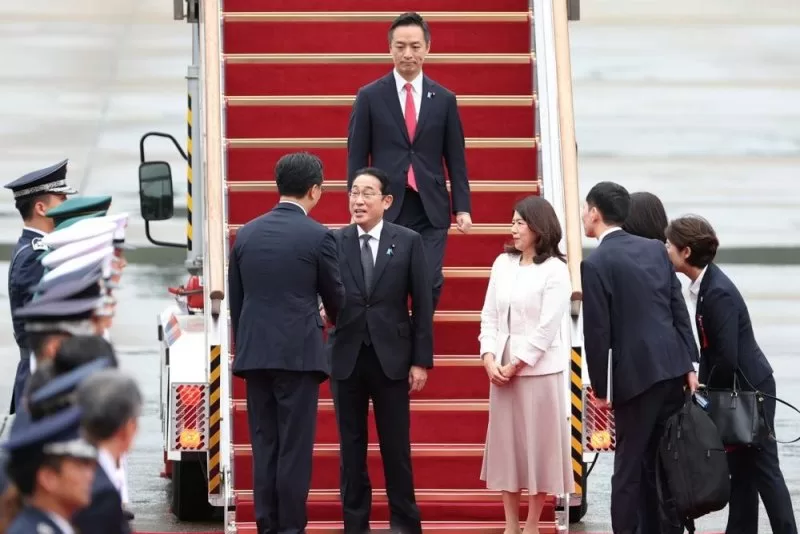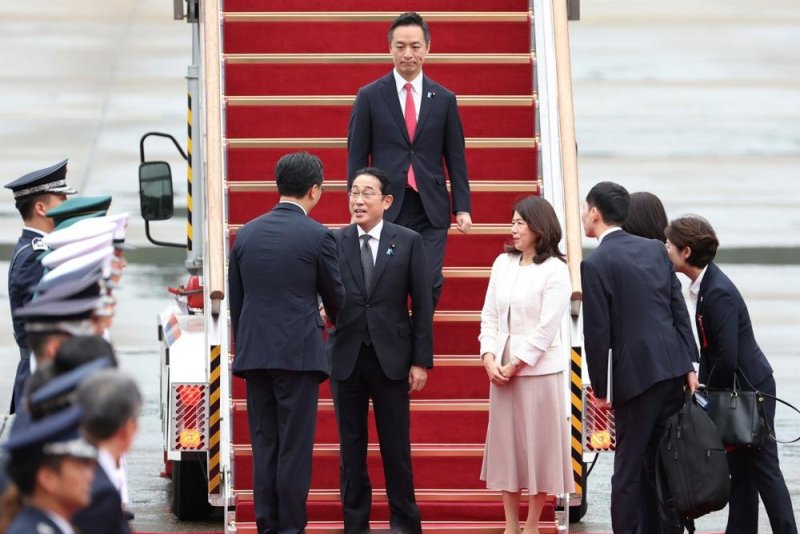Japanese Prime Minister Fumio Kishida (2-L) and his wife, Yuko Kishida (C-R), are welcomed by a South Korean official upon arrival at Seoul Airport in Seongnam, South Korea, on Friday for his final summit with South Korean President Yoon Suk Yeol. Photo by Yonhap/EPA-EFE
SEOUL, Sept. 6 (UPI) — Prime Minister Fumio Kishida of Japan arrived in Seoul on Friday as he looks to give a final boost to improved bilateral ties before stepping down from office later this month.
Kishida was scheduled to hold his 12th and last summit with South Korean President Yoon Suk Yeol, his partner in thawing out a frosty relationship that had reached its lowest point in decades around disputes over compensation for victims of wartime forced labor.
“When I became Prime Minister, our relationship with the ROK was in a very difficult situation, but thanks to the decision of President Yoon and myself, we were able to achieve a historic improvement in Japan-ROK relations,” Kishida wrote on X ahead of his departure, using the official acronym for South Korea.
The two leaders restored what they termed “shuttle diplomacy” after Yoon visited Tokyo in 2023, marking the first time a South Korean leader had visited Japan for a bilateral summit in a dozen years.
Relations between Seoul and Tokyo, complicated at the best of times, took a turn for the worse in 2018 when a Korean court ruled that two Japanese firms must provide compensation to victims of forced labor under Japan’s 1910-45 colonial occupation of Korea.
The Yoon administration announced a plan last year to resolve the dispute by using South Korean public funds to pay the victims. Both sides later made moves to lift trade restrictions that had emerged in the wake of the 2018 decision.
Seoul and Tokyo have also grown closer with Washington, particularly on security cooperation in response to North Korea‘s nuclear and missile threats. U.S. President Joe Biden invited Yoon and Kishida to Camp David for a first-ever trilateral summit in August last year, where the three leaders committed to strengthen joint responses to North Korea and other regional security challenges.
“Cooperation with the Republic of Korea is indispensable for the peace and stability of the region,” Kishida wrote on X Friday. “At a time when the international situation is at a turning point in history, it is important to deepen cooperation … and to continue to develop the relationship between the two countries in a future-oriented manner for the stability, peace and prosperity of the region.”
Kishida announced last month that he will step down from office, ending his three-year tenure amid a massive slush-fund scandal that has embroiled his Liberal Democratic Party. The LDP will hold elections on Sept. 27 to choose his successor.
South Korea’s Yoon said last week that improved ties and the trilateral security relationship would continue despite the coming leadership change.
“The South Korea-U.S.-Japan cooperation framework is very important not only to the Indo-Pacific but also the global economy and security, benefiting all three nations,” Yoon said at a press conference “A change in the leadership will not change this framework, and it will be upheld through the official diplomatic agreements.”
Kishida is scheduled to return to Tokyo on Saturday.

